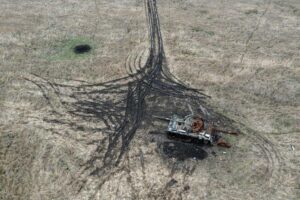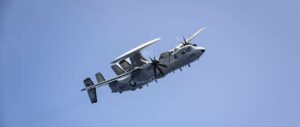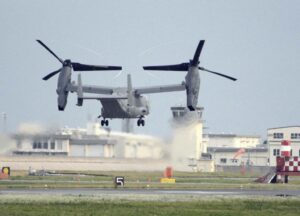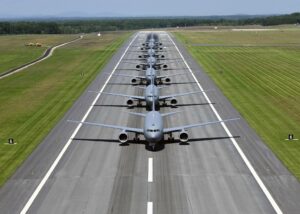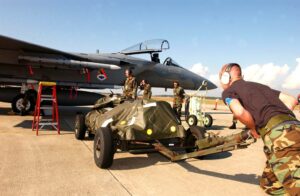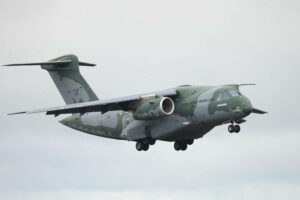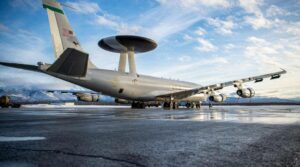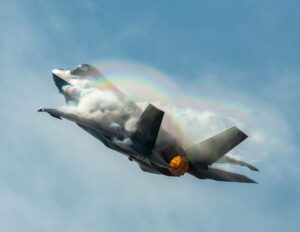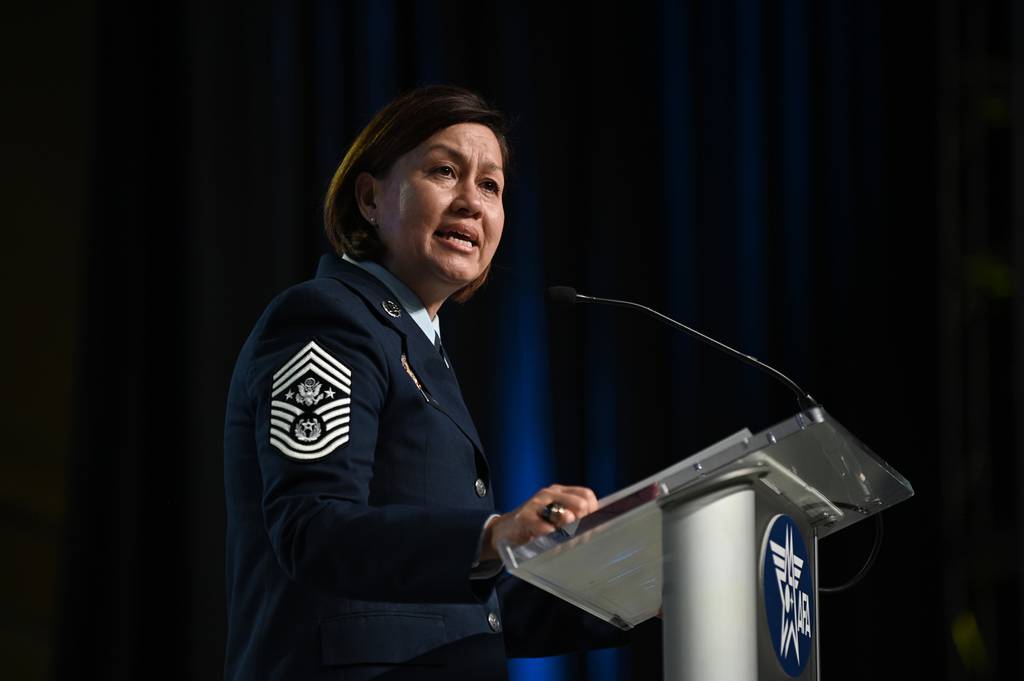
NATIONAL HARBOR, Md. — A new era of war fought in the digital realm, touching all aspects of combat and rife with disinformation, will require the Air Force to redefine its jobs and reinforce its rigor, the service’s top enlisted airman said here Wednesday.
In what may be her last major speech to the force while in the job, Chief Master Sergeant of the Air Force JoAnne Bass cautioned airmen not to “underestimate the cyber and the information domains” as major drivers and amplifiers of conflict.
“Warfare has taken on a new dimension,” Bass told a packed room at the Air and Space Forces Association’s annual Air, Space and Cyber Conference.
“Our adversaries understand the power of information, and they seek to exploit it, weaponize it and use it against us,” she said. “They aim to sow discord, erode trust and destabilize nations through the spread of disinformation and propaganda through emerging technology.”
She warned that “armies of bots, swarms of trolls and legions of ‘sock puppets’” run by nefarious parties are manipulating information online to distort perceptions of reality and shape society to their advantage.
That can look like Russian-linked social media operations to influence American voters in U.S. elections, phishing and hacking campaigns, or fake text and images generated by artificial intelligence.
Without naming specific social media, Bass said the service must educate airmen on the difference between “using these platforms and being used by them.” To prove her point, Bass said she had used the artificial intelligence language model ChatGPT to generate part of her speech.
Air Force leaders often raise concerns about falling behind in an age of digitally driven asymmetric warfare, and the changes that keeping up will require. The service in 2019 pulled information operations under the same umbrella as its intelligence and cyber divisions to begin bridging those gaps, but has struggled to recruit and retain the workforce to handle those missions.
In an exclusive interview with Air Force Times on Aug. 28, Bass said she believes the Air Force has too many career fields overall, and too few in the areas that will matter most in tomorrow’s wars.
“We have to take a strong look at our weapon systems, our platforms, the [jobs] that fill our Air Force,” Bass said. “Probably where we need to expand is in information, cyber and space.”
She declined to specify which Air Force specialty codes could be on the chopping block, or how many airmen the service might need to fill cyber and information ops jobs.
“I am not the best person to be able to say, ‘Here’s what we have too much of,’” she said. “What I’ve asked is [for] the career field managers to think deeply about their career fields, think deeply about what our Air Force is going to look like 10 years from now.”
She pointed to teams of airmen who are exploring what the future force could look like and said data analysis is underway to illuminate the way forward.
“We will continue as an Air Force to iterate to what we need to look like,” she added. “But we’re doing a lot of the groundwork and the homework right now.”
During her keynote, Bass reminded airmen that falling short of the Air Force’s conduct and appearance standards ultimately hurts the larger objective: presenting a unified front against America’s adversaries.
In June, she published an open letter to the force that pushed airmen to hold each other to high standards of professionalism to avoid damaging the service’s reputation and abilities.
“History shows that when standards erode, military capabilities and readiness decline,” she wrote. “We can’t afford to let this happen and still expect to keep pace with the rapid expansion of the Chinese military, Russian aggression, and other emerging global challenges.”
The Air Force has tried to implement more common-sense regulations for hairstyles, clothing and more that allow flexibility without hindering combat capability or unit cohesion. But Bass warned of taking it too far.
“If we are more focused on … ourselves, instead of the greater good of the force, then we are probably off-target,” she said.
Reflecting on her 30 years of service, Bass began to cry.
“I have greatly loved four things in life: my faith, my family, my country and this Air Force,” she said. “This is more than just a job. … This is our higher calling.”
Rachel Cohen joined Air Force Times as senior reporter in March 2021. Her work has appeared in Air Force Magazine, Inside Defense, Inside Health Policy, the Frederick News-Post (Md.), the Washington Post, and others.
- SEO Powered Content & PR Distribution. Get Amplified Today.
- PlatoData.Network Vertical Generative Ai. Empower Yourself. Access Here.
- PlatoAiStream. Web3 Intelligence. Knowledge Amplified. Access Here.
- PlatoESG. Carbon, CleanTech, Energy, Environment, Solar, Waste Management. Access Here.
- PlatoHealth. Biotech and Clinical Trials Intelligence. Access Here.
- BlockOffsets. Modernizing Environmental Offset Ownership. Access Here.
- Source: https://www.defensenews.com/news/your-air-force/2023/09/13/bass-warns-airmen-to-prepare-for-asymmetric-warfare/
- :has
- :is
- :not
- :where
- $UP
- 1
- 10
- 13
- 2019
- 2021
- 28
- 30
- 70
- a
- abilities
- Able
- About
- added
- ADvantage
- against
- age
- aim
- AIR
- Air Force
- All
- allow
- am
- American
- an
- analysis
- and
- annual
- appeared
- ARE
- areas
- artificial
- artificial intelligence
- AS
- aspects
- At
- Aug
- avoid
- bass
- BE
- becomes
- began
- begin
- behind
- being
- believes
- BEST
- between
- Block
- bots
- bridging
- but
- by
- calling
- Campaigns
- CAN
- capabilities
- capability
- Career
- challenges
- Changes
- ChatGPT
- chief
- chinese
- chopping
- Chopping Block
- Clothing
- codes
- cohen
- cohesion
- combat
- Concerns
- Conduct
- Conference
- conflict
- continue
- could
- country
- cyber
- damaging
- data
- data analysis
- Decline
- Defense
- difference
- digital
- digitally
- Dimension
- discord
- disinformation
- doing
- driven
- drivers
- each
- educate
- Elections
- emerging
- Emerging Technology
- Era
- Ether (ETH)
- Exclusive
- Expand
- expansion
- expect
- Exploit
- Exploring
- faith
- fake
- Falling
- falling short
- family
- far
- few
- field
- Fields
- fill
- Flexibility
- focused
- For
- Force
- Forces
- Forward
- four
- Frederick
- from
- front
- future
- gaps
- generate
- generated
- Global
- going
- good
- greater
- greatly
- groundwork
- hacking
- had
- handle
- happen
- harbor
- Have
- Health
- her
- here
- High
- higher
- hold
- homework
- How
- HTTPS
- hurts
- illuminate
- images
- implement
- in
- influence
- information
- inside
- instead
- Intelligence
- Interview
- IT
- ITS
- joanne
- Job
- Jobs
- joined
- jpg
- june
- just
- Keep
- keeping
- Keynote
- language
- larger
- Last
- leaders
- let
- letter
- Life
- like
- Look
- look like
- Lot
- loved
- magazine
- major
- Managers
- manipulating
- many
- March
- master
- Matter
- May..
- Media
- might
- mike
- Military
- missions
- model
- more
- most
- much
- must
- my
- naming
- Nations
- Need
- New
- now
- objective
- of
- often
- on
- online
- Operations
- or
- Other
- Others
- our
- ourselves
- overall
- Pace
- packed
- part
- parties
- person
- phishing
- Platforms
- plato
- Plato Data Intelligence
- PlatoData
- Point
- policy
- Post
- power
- Prepare
- probably
- professionalism
- Propaganda
- Prove
- published
- pushed
- raise
- rapid
- Readiness
- Reality
- realm
- recruit
- redefine
- reflects
- regulations
- reinforce
- reporter
- reputation
- require
- retain
- right
- Room
- Run
- russian
- s
- Said
- same
- say
- Seek
- senior
- service
- Shape
- she
- Short
- Shows
- Social
- social media
- Society
- sow
- Space
- Specialty
- specific
- speech
- spread
- standards
- Still
- strong
- Systems
- Take
- taken
- taking
- teams
- Technology
- text
- than
- that
- The
- The Chopping Block
- The Future
- the information
- The Washington Post
- their
- Them
- then
- These
- they
- things
- think
- this
- those
- Through
- times
- to
- told
- too
- top
- touching
- tried
- Trust
- u.s.
- Ultimately
- umbrella
- under
- understand
- Underway
- unified
- unit
- us
- use
- used
- voters
- war
- Warns
- washington
- washington post
- Way..
- we
- Wednesday
- What
- when
- which
- while
- WHO
- will
- with
- without
- Work
- Workforce
- wrote
- years
- zephyrnet

